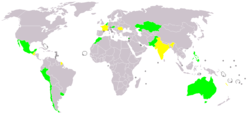- Moon Treaty
-
Moon Treaty Agreement Governing the Activities of States on the Moon and Other Celestial Bodies 
Ratifications and signatories of the treaty
signed and ratifiedonly signedSigned December 18, 1979 Location New York, USA Effective July 11, 1984 Condition 5 ratifications Parties 17 Depositary Government of the United States of America Languages English, French, Russian and Spanish  Moon Treaty at Wikisource
Moon Treaty at WikisourceInternational Ownership Treaties Antarctic Treaty System Law of the Sea Outer Space Treaty Moon Treaty International waters Extraterrestrial real estate The Agreement Governing the Activities of States on the Moon and Other Celestial Bodies,[1] better known as the Moon Treaty or Moon Agreement, is an international treaty that turns jurisdiction of all celestial bodies (including the orbits around such bodies) over to the international community. Thus, all activities must conform to international law (notably this includes the UN Charter).
In practice, it is a failed treaty since it has not been ratified by any nation which engages in self-launched manned space exploration or has plans to do so (e.g. the United States, The United Kingdom, European Union, Russian Federation, People's Republic of China, Japan, and India) since its creation in 1979, and thus has a negligible effect on actual spaceflight.
Contents
Content
The treaty would apply to the Moon and to other celestial bodies within the Solar system, other than the Earth, including orbits around or other trajectories to or around them.[citation needed]
The treaty makes a declaration that the Moon should be used for the benefit of all states and all peoples of the international community. It also expresses a desire to prevent the Moon from becoming a source of international conflict. To those ends the treaty:[citation needed]
- Bans any military use of celestial bodies, including weapon testing or as military bases.
- Bans all exploration and uses of celestial bodies without the approval or benefit of other states under the common heritage of mankind principle (article 11).
- Requires that the Secretary-General must be notified of all celestial activities (and discoveries developed thanks to those activities).
- Declares all states have an equal right to conduct research on celestial bodies.
- Declares that for any samples obtained during research activities, the state that obtained them must consider making part of it available to all countries/scientific communities for research.
- Bans altering the environment of celestial bodies and requires that states must take measures to prevent accidental contamination.
- Bans any state from claiming sovereignty over any territory of celestial bodies.
- Bans any ownership of any extraterrestrial property by any organization or person, unless that organization is international and governmental.
- Requires all resource extraction and allocation be made by an international regime.
Ratification
The treaty was finalized in 1979 and entered into force for the ratifying parties in 1984. As a follow-on to the Outer Space Treaty, the Moon Treaty intended to establish a regime for the use of the Moon and other celestial bodies similar to the one established for the sea floor in the United Nations Convention on the Law of the Sea.
As of December 19, 2008, only 13 states; Australia, Austria, Belgium, Chile, Kazakhstan, Lebanon, Mexico, Morocco, Netherlands, Pakistan, Peru, Philippines, and Uruguay, have ratified it. France, Guatemala, India and Romania have signed but have not ratified it.[2] As it is unratified by any major space-faring powers (including India) and unsigned by most of them (except India), it is of no direct relevance to current space activities.[citation needed]
See also
Extraterritorialities Antarctica Embassy Extraterrestrial real estate International waters International seabed Moon Outer Space International zone United Nations See also International organization References
- ^ Agreement Governing the Activities of States on the Moon and Other Celestial Bodies, Dec. 5, 1979, 1363 U.N.T.S. 3
- ^ Status of international agreements relating to activities in outer space as at 1 January 2008 United Nations Office for Outer Space Affairs, 2008
External links
- Treaty Text — "Agreement Governing The Activities Of States On The Moon And Other Celestial Bodies" (1979)
- Official Treaty Site — United Nations Office for Outer Space Affairs (UNOOSA), including versions of the treaty in several languages: عربي, 中文, English, Français, Русский, and Español.
Categories:- Cold War treaties
- Space colonization
- Spaceflight
- Space law
- Treaties concluded in 1979
- Treaties entered into force in 1984
Wikimedia Foundation. 2010.
